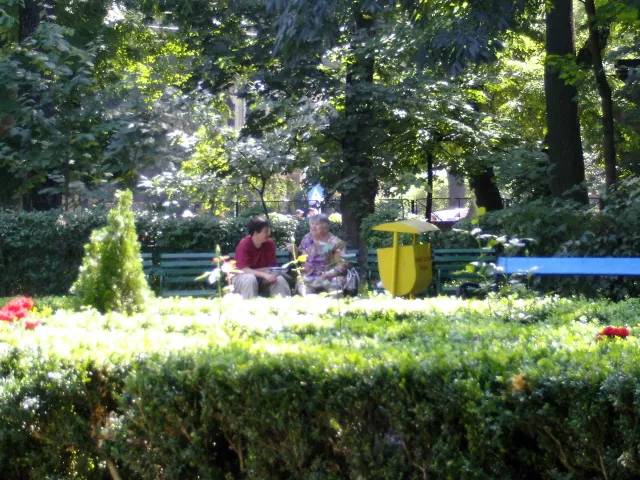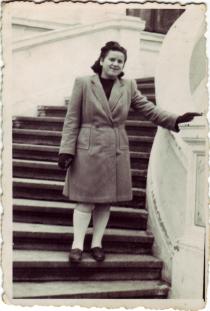Rifca Segal with Centropa`s interviewer
[Editor’s note: This is a picture taken clandestinely in the Public Garden in Botosani in 2006, during a meeting between Mrs. Rifca Segal and interviewer Emoke Major.]
I, Rifca Segal, was born in 1928 in Sulita. Officially, my name is Rifca, they named me after a great-grandmother, the mother of my grandmother from my mother’s side. But people call me Rica, as Sulita’s county chief – his name was Hotupasu – had a daughter whose name was Rica. And my parents were very good friends with the county chief.
My mother was a housewife, and my father was a merchant. My father inherited his father’s and grandmother’s store, he continued to run their store. They sold haberdashery, shoes, perfumes, small ware, everything. My parents bought supplies from Botosani. There were merchants who came from Botosani with cases of merchandise, who recommended you products, and you chose what you wanted. We had been rich until 1941, when the legionnaire regime 6 came to power and they kicked us out of our home and we left with the clothes on our back 1. And we began to experience dire poverty. Hadn’t the legionnaires come to power, we would have had such a good life in Sulita. They destroyed us back then.
There were legionnaires everywhere 2, they were in Sulita as well. There was a worker at a mill in Sulita, it was a Blumer mill – and they were rich –, and he carried wheat sacks at the mill. And when the legionnaires came to power, he became a leading legionnaire, and he came and knocked on our window shutters – well, someone put him up to this –: “Jews belong in Palestine!” But we didn’t want to leave. And then they kicked us out. My uncles who were living in Frumusica left, they came to Botosani as they feared the legionnaires. I couldn’t say when exactly, but still I believe they came to Botosani a year, a year and a half before we did, when the legionnaires came to power. But they moved there because they were afraid, for the legionnaires were in power by then, and they were knocking on windows, doors, they were threatening us. And they didn’t wait to be thrown out of their home. We did, and we were wrong to do so.
And in June 1941 we were evacuated from Sulita. When we came to Botosani, a drizzle was falling – it was very fine, with no lightning’s or thunders –, and we sluggishly came to Botosani in a cart pulled by oxen – a distance of 32 km [35 km]. We were supposed to look for a peasant to rent a cart from him. We brought along as many things as we could carry. I couldn’t tell you exactly what… But I do remember that we certainly brought along a quilt, a pillow, the clothes that we were wearing, for we couldn’t take more, there were 6 of us. I had another sister and a brother, and my father’s grandmother lived with us. And so my parents plus my grandmother were 3 persons, and with us, 3 children, we were 6, all in all. Well, how many things could we take with us? For the entire merchandise, things, furniture, everything was left behind. And then the legionnaires burned it. They burned everything, houses, things. And I wanted to claim it back nowadays, based on law 112 [Ed. note: law no. 112/1995 for regulating the legal situation of some buildings destined for housing, who were entered in the property of the state.], but the lawyer – I’m surprised by it, he was a good lawyer –, who drew the sale-purchase deed of the house to my parents, didn’t record the surface area. He wrote: it has a common border with such, it has a common border with such, it has a common border with such. As they used to record these things formerly. And they didn’t record my claim. And I lost some money. If it were only for the money…





































